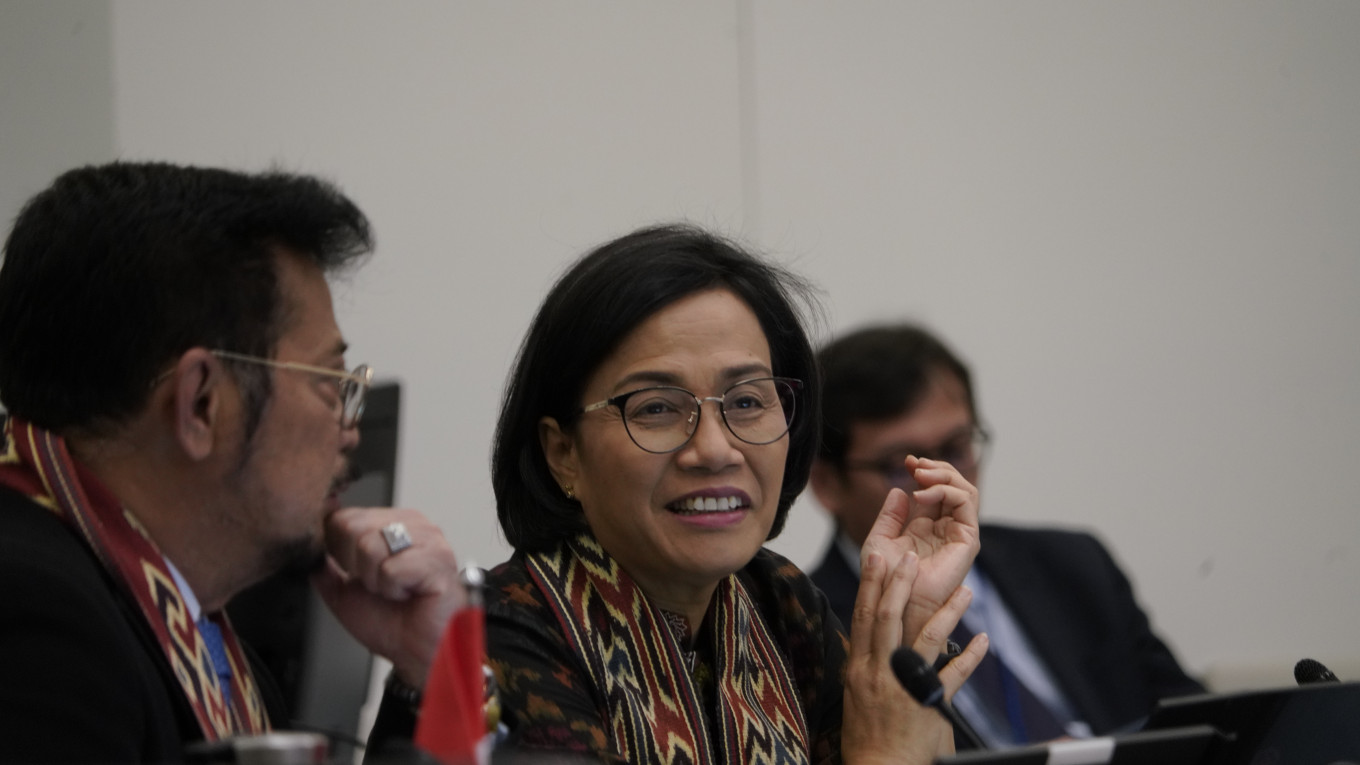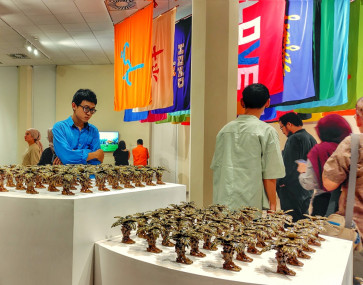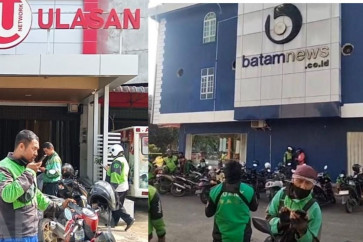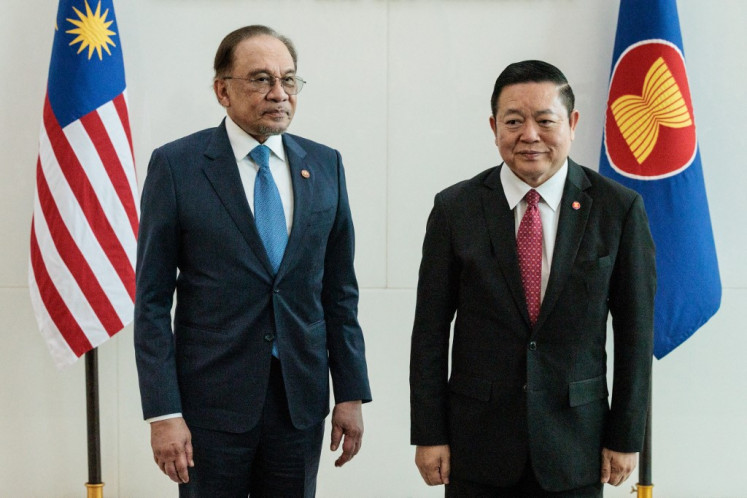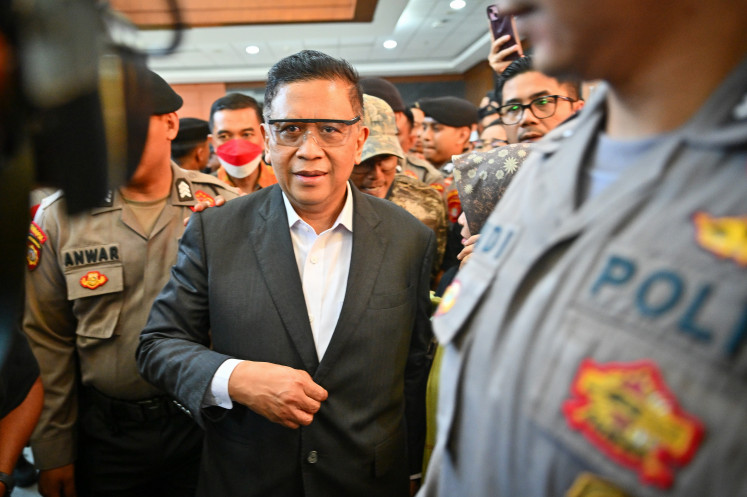Popular Reads
Top Results
Can't find what you're looking for?
View all search resultsPopular Reads
Top Results
Can't find what you're looking for?
View all search resultsRI proposes ‘triple intervention’ to prevent global food crisis
Change text size
Gift Premium Articles
to Anyone

Indonesian officials have proposed to the Group of 20 a set of possible solutions to a looming global food crisis as geopolitical tensions threaten food and fertilizer supplies worldwide.
At a press conference in Washington, DC, on Tuesday, Agriculture Minister Syahrul Yasin Limpo said the G20 was committed to guaranteeing continued food production and making it available for cross-border trade.
Syahrul was speaking at the first Joint Finance and Agriculture Ministers Meeting (JFAMM), which brought together top officials from G20 countries as part of the G20 forum, which Indonesia is chairing this year.
Data from Statistics Indonesia (BPS) show that food, beverage and tobacco prices were up 7.91 percent year-on-year (yoy) in the country as of September, far above the 5 percent the central bank had proclaimed as the maximum acceptable food inflation rate.
“All countries are worried about the presence of a food crisis that really needs to be responded to more seriously,” Syahrul said.
Read also: Indonesia warns of global food insecurity
G20 members have vowed to buttress food security through agricultural production as well as “free, fair, predictable, transparent and non-discriminatory food trade” for all countries.
The minister called on the G20 to increase the production of key food commodities that weighed heavily on inflation, reduce imports through substitution with domestic goods where possible and increase food exports. He said Indonesia was already on track with these policies, which he referred to as a “triple intervention”.
“Food is a human right, so there should be no barriers between nations that hamper the availability, distribution, access or affordability of food for all,” Syahrul said.
The agriculture chief said the coronavirus pandemic had affected the movement of goods and services at both the global and local level, which had seriously impacted food distribution systems and led to a “significant increases in food prices”.
The skyrocketing price of fertilizer, the minister added, had become a “significant global problem” as food production costs would inevitably increase, adding to inflationary pressure.
Fertilizer prices have risen amid global scarcity as Western sanctions complicate shipping, insurance and payments in trade with Russia, a crucial global supplier of fertilizer.
Several countries, Syahrul lamented, were amassing national food stockpiles, causing imbalances in global supply chains, while geopolitical tensions had also disrupted the global trade of goods. This, he said, jeopardized food security and nutrition in Indonesia, particularly for poor rural communities and some urbanites.
World Trade Organization director general Ngozi Okonjo-Iweala said on Oct. 5 that protectionism was on the rise as the number of trade restrictions had increased from 42 to 53.
Read also: Food estate program dubbed ‘total failure’ as technical problems persist
Speaking at the same event, Finance Minister Sri Mulyani noted that ensuring cross-border food trade would improve global supply and distribution, a view shared by several other delegates.
Protectionist policies, she noted, were often the result of popular domestic pressure in an already existing food crisis.
“So how we are going to lessen this trade-off and lessen this tension [is a question we need to address], so that, in the end, [we are] not going to be worse off globally,” the minister told reporters.
She said there was unified concern over the issue of fertilizer among G20 members and several international institutions, in particular the Asian Development Bank (ADB), the Food and Agricultural Organization (FAO) and the World Bank.
Today’s fertilizer problem, she warned, could cause a crisis in eight to 12 months “as we are heading into 2023, which is going to be much, much riskier”.
At the JFAMM, she said, member states had agreed to instruct the World Bank and FAO to “map” the various global food security initiatives currently underway.
The goal was to have a database of the initiatives and detect any overlapping programs while identifying aspects these initiatives had yet to address.
Several organizations have launched food security initiatives, including the United Nations Global Crisis Response Group (GCRG), the Group of 7 Global Alliance for Food Security (GAFS) and China’s Global Development Initiative.
State-owned Bank Mandiri agriculture expert Andrian Bagus Santoso noted that the high price of natural gas, a key component in the production of fertilizer, had exacerbated the issue.
"In Indonesia, we were quick to find new suppliers, especially Canada and Jordan, although they have not fully replaced the declining portion from China," Andrian told The Jakarta Post on Wednesday.
The higher prices were forcing farmers to cut back on fertilizer, resulting in suboptimal harvests.
While he felt the "triple intervention" policy could work in the medium term, he suggested the government sign bilateral trade deals to secure more immediate food supplies, particularly for commodities that needed to be imported.

